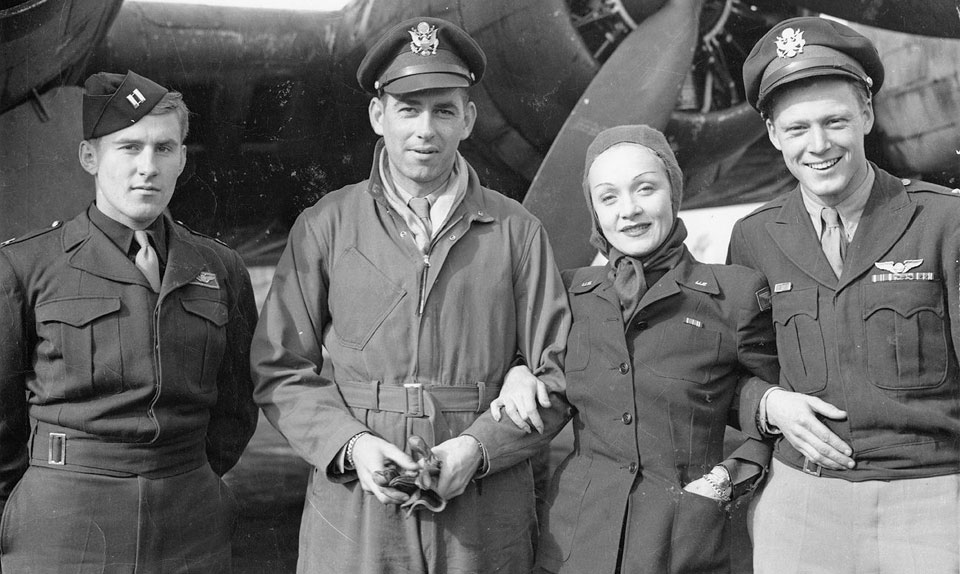By Jenny Farrell
Marlene Dietrich, who died 30 years ago, on May 6, 1992, must be remembered not only for her importance as role model for emancipation but also for her outspoken and active stand against the Nazi movement that had overtaken her homeland.
Born in Berlin on December 27, 1901, she became one of the most famous actors of all time. Her breakthrough came with the 1930 film The Blue Angel. She left Germany for Hollywood in that year. When the Nazis were stripping other artists’ German citizenship, she renounced hers. Throughout the Second World War, Dietrich actively engaged in the anti-fascist struggle. When she visited Germany after the war, she was deemed a traitor in West Germany, with relatively small numbers attending her funeral almost half a century after the end of the war.
Dietrich’s father, Louis Otto Dietrich, an officer, died when Dietrich and her sister were very young. A few years later, Dietrich’s mother married Eduard von Losch, who was killed in World War I. As a child, Marlene loved music and intended to become a concert violinist. A wrist injury in her teens made this impossible. After that, she turned her interest to the stage. She auditioned unsuccessfully at Berlin’s famous Max Reinhardt Drama School. Nevertheless, she pursued acting and obtained a number of minor parts. All this changed when she was discovered by Josef von Sternberg for his new film project.
This film, directed by Sternberg and co-starring the famous Emil Jannings, was shot largely in 1929 and premiered in 1930. Germany, like the U.S. and other countries, was badly affected by the Wall Street stock market crash. To make matters worse, if not catastrophic, the loans Germany had been given to help boost its economy and to pay its war reparations over time—the U.S. Dawes and Young Plans—suddenly dried up.
Germany, which had been in a ruinous state after WWI, and which from the mid-1920s had experienced a boom, thanks to these loans, and a false sense of security, crashed badly. It is important to bear this background in mind when thinking about The Blue Angel. As we now know, the severe economic crisis that ensued offered fertile ground for the rise of German fascism, which until then had not attracted much interest or support. This too is a backdrop to understanding the film.
The Blue Angel is a tragedy, with the pompous, but by no means malevolent teacher Emmanuel Rath as its tragic hero. Professor Rath corresponds entirely to Aristotle’s definition of tragic hero: “an intermediate kind of personage, not pre-eminently virtuous and just,” whose destruction is attributed not to vice or depravity, but to an error of judgment. The hero is a basically decent and inoffensive person. He must induce a sense of pity and fear within the audience, with pity arising when the character is utterly destroyed, while fear is aroused when the audience realizes that such fate could befall them too. Shakespeare adds to this definition with his tragedies, that the character’s frailty is one provoked by the times they live in, by an inability to cope with a new set of mores. In this sense, it is the new times that are instrumental in bringing down the tragic hero.
This is what happens in the case of Professor Rath, representing the older generation. He is made a fool of by the younger generation, his students, whom he cannot control but only make empty threats to. Instead, the boys control him. Rath is, however, coldly destroyed by the young cabaret dancer Lola.
Cabaret had become very popular in the Weimar Republic and represented something very new, modern, and decadent. Film buffs might like to watch Act V of Berlin: Symphony of a Great City, where a falsely prosperous Berlin is shown at its most modern in 1927, with electricity, cinemas, and cabarets. Cabaret is very much associated with the Golden Twenties of the Weimar Republic. The Blue Angel reveals this world to be a struggle for survival, where money—the show—takes precedence over human decency and dignity. A sad, silent clown wanders about backstage, foreshadowing Rath’s fate. The club where Lola performs is covered in nets and ropes, which frequently entangle Rath.
Rath is not a bad person. However, he is unfit for modern times. Pompous, ineffective, and naïve, he is unable to see these times for what they are. Rath’s dignity is destroyed—his inner core, his identity—and this causes his descent into madness. First, he loses all confidence and sense of himself as a teacher, reduced to selling “sexy” cards advertising Lola. His marriage is unconsummated and his wife takes lovers. The ultimate blow comes when the theater company returns to his hometown. Past colleagues witness the extent of his destruction and, as the company director insists on a final humiliation, madness, and death.
In this sense, Rath is a true tragic hero, destroyed by the new age that has dawned. His weakness is that he cannot understand the nature of the times, nor can he find a way to save himself. Ultimately, the new times destroy him.
Given this reading, The Blue Angel foreshadows aspects of Nazi Germany, a ruthlessness that will not shrink from destroying people, and that was set to rise to power meteorically.
Both Sternberg and Dietrich left Germany for Hollywood in 1930. In the 1930s and 1940s, Dietrich starred in many famous films, including Shanghai Express (1932), I Love a Soldier (1936), Manpower (1941), and The Lady is Willing (1942). She was among the first to embody the emancipated woman onscreen and became a style icon with her characteristic trouser suits, hats, and challenge to other “male” domains. She had relationships with both men and women and is celebrated to this day by the LGBTI community.
The Blue Angel was banned in Germany in 1933. Jewish actor Kurt Gerron, the company director and magician in the film, had originated the role of Tiger Brown in the 1928 production of Kurt Weill and Bertolt Brecht’s The Threepenny Opera and was the first to publicly perform and record the song, “Mack the Knife.” (He was later murdered by the Nazis, after suffering terrible humiliation.) The Inn Keeper, the Hungarian Jewish actor Charles Puffy died while fleeing Hungary from the Nazis. Hans Albers, Lola’s young lover, on the other hand, stayed in Germany during the Nazi regime and became a star actor, although he never endorsed the fascists. Carl Balhaus, the boy in Rath’s class who feels for him and is bullied by the others, is the only actor in the film who lived in the German Democratic Republic (East Germany) after the defeat of fascism and worked for DEFA, the state film production company.
As Nazi Germany was revoking the citizenships of many German artists, leaving them stateless, Dietrich spurned all overtures by the Hitler regime and renounced her German citizenship when WWII broke out and took out U.S. nationality. Together with Billy Wilder among others, Dietrich set up a fund to help persecuted people flee Germany.
When Dietrich died at the age of 90, her funeral service in Paris was attended by approximately 1500 mourners in the church itself with thousands more outside. Three medals were displayed at the foot of the coffin recognizing Dietrich’s fight against Nazism. (IPA Service)
Courtesy: People’s World

 New Army Chief General Manoj Pande Is A Person Of Diverse Qualities
New Army Chief General Manoj Pande Is A Person Of Diverse Qualities 